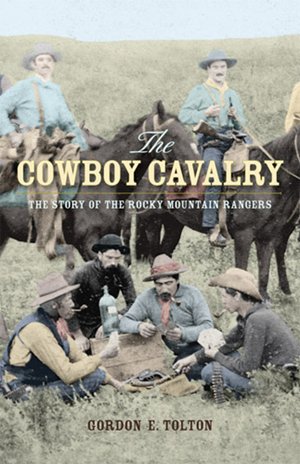Cowboy Cavalry: The Story of the Rocky Mountain Rangers

Support Canada's History in other ways (more)
by Gordon E. Tolton
When one comes across the phrase “Northwest Rebellion of 1885,” connections are usually drawn to Saskatchewan and Manitoba in terms of geography and to Louis Riel, Gabriel Dumont, Big Bear, and Poundmaker in terms of people.
There is, however, a less widely known episode that occurred in southern Alberta that fateful early summer. Over a three-month period, paranoia fuelled by propaganda had led to the creation of a small armed militia with instructions to defend their homesteads, whatever the cost. Comprised of frontiersmen, ex-Mounties, ex-convicts, and ranchers, this ragtag bunch was known as the Rocky Mountain Rangers.
The first part of Gordon E. Tolton’s The Cowboy Cavalry sets up the context that led to the creation of this volunteer militia. Tolton does an excellent job of explaining the strategic positions held by the leaders of the Blackfoot, Blood, and Peigan First Nations — respectively, Crowfoot, Red Crow, and Eagle Tail Feather — and why Riel’s fight was not necessarily their fight. The distinctions and varying motivations among the First Nations were somewhat lost on the ranchers, who allowed themselves to get carried away by the sentiments of the day; they were also shackled by snail’s-pace communications.
The book’s second part provides greater detail about the distribution of arms and troop movements, which is fine for military enthusiasts; for the rest of us, the middle chapters may feel like a hard and bumpy road. In the end, the skirmish was much ado about nothing. The local First Nations were not convinced that Riel and Dumont’s rebellion was in their best interest and they let the opportunity pass. The rangers encountered little “action,” but were nonetheless welcomed home with the same fanfare as conquering heroes.
Was there a loser? My vote would be for Major John Stewart, the man who negotiated government funding for the rangers, but was left paying part of the tab when Riel was safely executed, paranoia had subsided, and government purse strings were drawn tight.
— Tanja Hütter (Read bio)
Tanja Hütter is Online Manager for Canada's History Society and a pragmatic idealist.